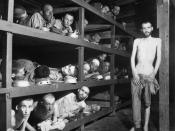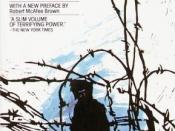Night by Elie Wiesel
During the WWII, million of the Jews were sent to the concentration camp due to the Hitler's anti-Semitic policy. The autobiography, Night, by Elie Wiesel is written proof of the real life horror that existed during the Holocaust. Elie was growing up in a small Jewish town. His world revolved around family, religious study, community and God, but all the important things to him were destroyed when he and his family were taken to the concentration camp. At that time, he was only 14. The tortures at the camp caused his beliefs about God to change. He started questioning the existence of god, and after he witnessed the death of the innocence, and the death of his family, he had lost the beliefs in God.
At the beginning of the book, Elie was 12, a strong believer in God. He read the Talmud daily, visited synagogue nightly and studied the cabbala with Moshe the Beadle.
Even after the Nazi started treating the Jews unfairly, all the anti-Jewish decrees and the ghettos didn't seem to have much effect on the Elie; he kept his faith in God without question.
However, things started to change when Elie and his family were taken from their town to the concentration camp at Birkenau, where he was separated with his mother and sisters forever. By witness the children and babies burning in the flame, he was questioning himself, why should he praise the god while the god tolerated such cruel things to happen. The first night in camp turned Elie's life completely. It was the first time he learned how people could be so cruel to the others, it was the night that turned his dream to dust, and it was the night he lost the faith in God.
From that day on, although many people believed the concentration camp is where the God tests them, judges their characters, and proves that God loved them, Elie doubted the God's absolute justice. As time went by, Elie became accustomed to all the horrors he had experienced. Unlike the beginning of the book, which he take care the neighbors with all he can do for them, now he cared only the food but no one else. He was numb to the burning body, to the beating and to the hard works. But one day, the last hope was torn away from Elie when he had to witness the hanging of a small boy. "For more than half an hour he stayed there, struggling between life and death, dying in slow agony under our eyes." (62) A man behind Elie asked, "Where is God? Where is He?....Where is God now?" A voice inside Elie answered, "Where is He? Here He is-He is hanging here on this gallows..." (62) At this moment, Elie's world was collapsed, and the God was murdered.
At the New Year's Day, while everyone prayed, he rebelled inside his mind, as he thought "why should I bless Him, who chose us from among the races to be tortured day and night, to see our fathers...end in the crematory?"(64) Elie felt he was alone in the world, without God, without love and mercy. The only thing he left was his father, and the only support that helped him to go on.
In fact, Elie's father is the most important person in the Elie's life. He was the one who always told Elie not to loss the faith, not to give up the hope. While one the train, everyone was fighting each other to death for only a piece of bread, he stayed with his father. While some children abandoned their parents in order to get higher chance of survival, such as Rabbi Eliahou's son, he prayed to the god for the last time, asking for the strength not to do the same thing as Rabbi Rliahou's son had done. While his father was dying, although he knew he could do nothing and he should save the food for himself, Elie shared the food with his father. His father had replaced the God's position inside Elie's mind, after the death of his father, as he admitted in the book, nothing could affect him no more.
Ten years after Elie survived from the concentration camps, he wrote the book about his own experience in the concentration camp. Ordinary people can never image what kind of life the Elie had been through. An innocent boy, who committed his life to God, was sent into the hell without reasons. He witness the death of his family, and the death his innocence; he was tortured by Germans in an inhuman way, and felt betrayed by the God. The concentration camp had changed him; he lost everything including the faith in God.


